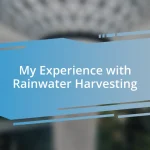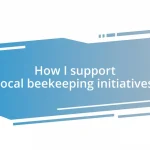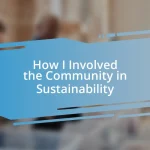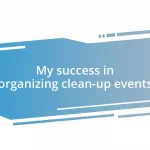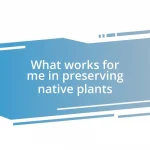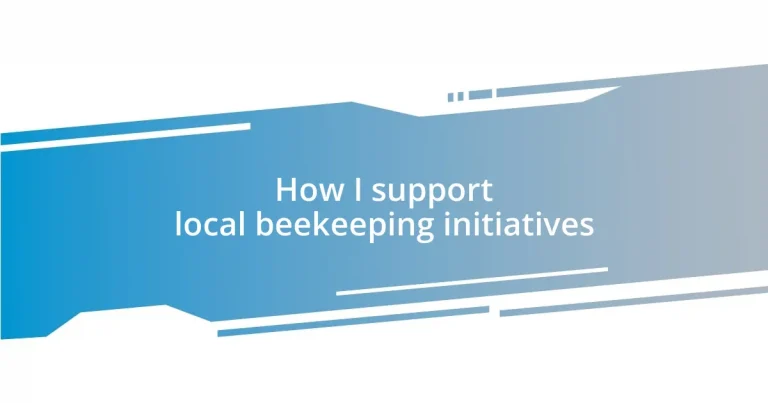Key takeaways:
- Local beekeeping initiatives enhance community connections and promote environmental sustainability.
- Supporting local beekeepers boosts pollination, local economy, and potentially improves health through local honey.
- Educational methods, such as workshops and social media campaigns, engage the community in beekeeping awareness and practices.
- Encouraging sustainable beekeeping practices fosters environmental stewardship and creates supportive habitats for bees.
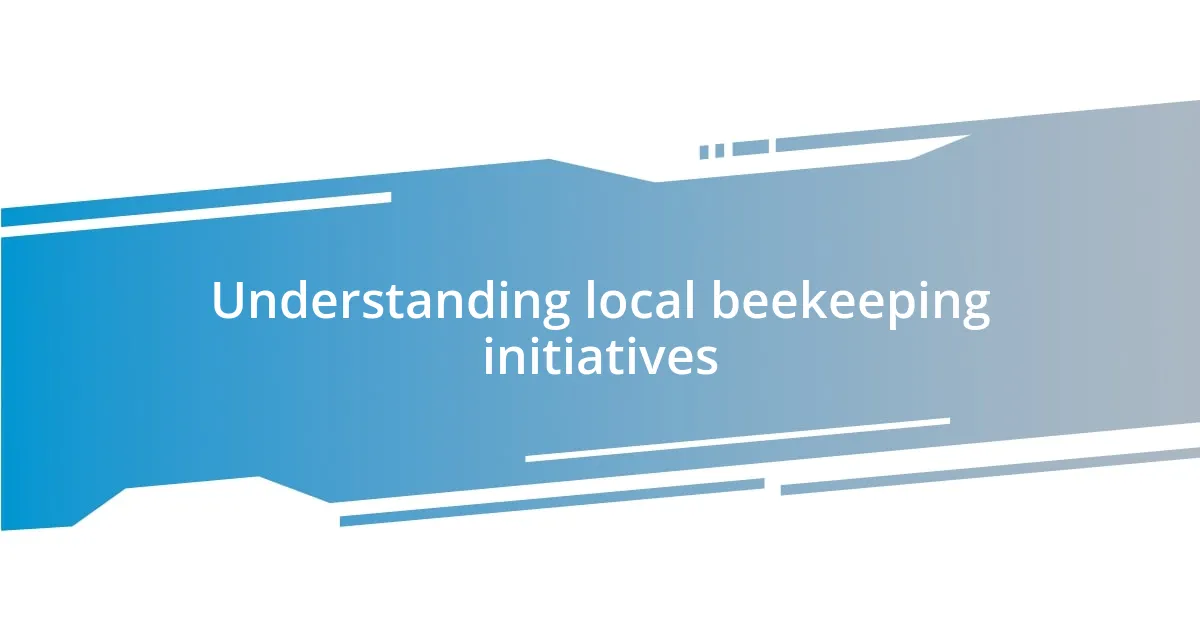
Understanding local beekeeping initiatives
Local beekeeping initiatives are essential for nurturing both the environment and community. I remember visiting a local beekeeping workshop where I witnessed firsthand how passionate beekeepers are about their craft. They shared stories about the challenges they face, like colony collapse disorder, which made me realize how critical these initiatives are for preserving the bee population that supports our ecosystems.
What strikes me is the sense of community that blossoms around these efforts. Beekeepers often forge connections with local farmers, gardeners, and even schools, creating a network that benefits all. Have you ever considered how a small hive in your neighbor’s backyard could boost local pollination and ultimately lead to a flourishing garden? That’s the power of local beekeeping—it’s an interconnected web that supports not just bees, but the very fabric of our community.
Understanding local beekeeping initiatives also opens the door to sustainable practices. For instance, I often see beekeepers promoting organic gardening methods to ensure a safe habitat for their bees. When we engage with these initiatives, we not only help protect the bees but also empower ourselves to make more environmentally conscious choices. Isn’t it inspiring to think about the positive impact we can have, simply by getting involved?
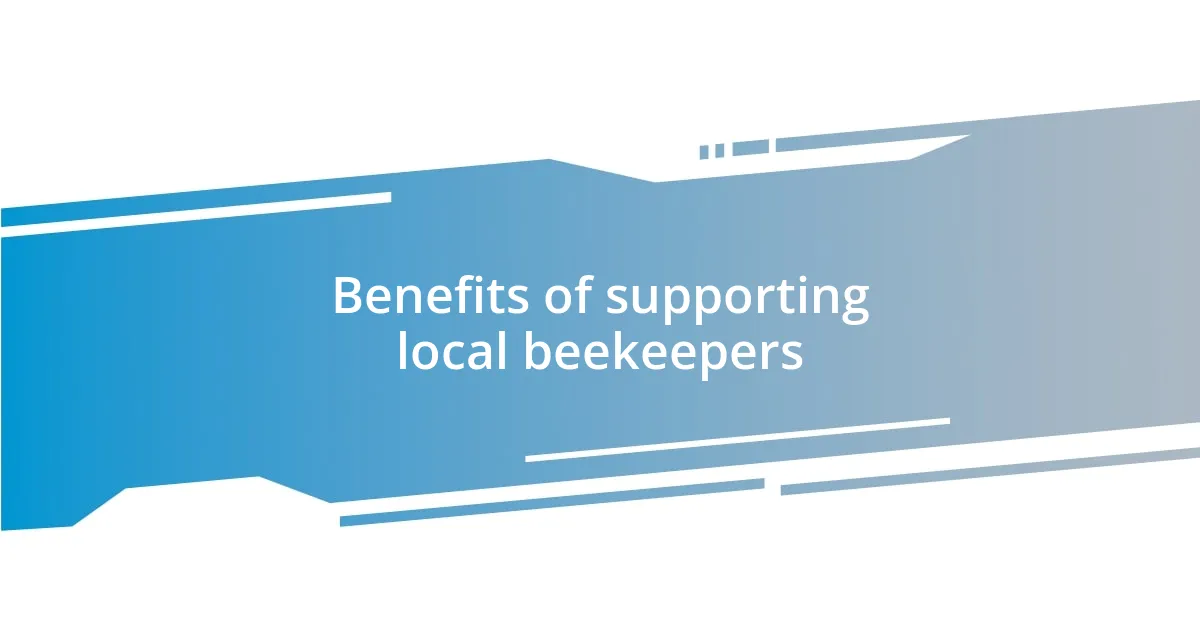
Benefits of supporting local beekeepers
Supporting local beekeepers offers a myriad of benefits that extend far beyond the sweet taste of honey. I remember attending a farmers’ market where local honey was sold; the unique flavors reflected the diverse flowers blooming nearby. Each jar told a story about the local landscape and the plants that thrive thanks to bees. This not only enriches our culinary experiences but also fosters a deeper appreciation for local agriculture.
Here are a few key benefits of supporting our local beekeeping community:
- Enhanced Pollination: Local bees help pollinate flowers in gardens and farms, leading to better crop yields and healthier plants.
- Environmental Sustainability: Supporting local beekeepers encourages biodiversity and the preservation of local flora.
- Healthier Communities: Local honey may contain local pollen, which can help reduce allergies and boost immunity.
- Economic Support: Buying from local beekeepers helps keep money within the community, fostering economic growth and resilient small businesses.
By choosing to support local beekeepers, I feel like I’m contributing to a healthier environment and a more sustainable future—something I believe is worth every sweet drop.

Ways to educate the community
One effective way to educate the community about local beekeeping is by organizing workshops and hands-on demonstrations. I vividly recall a weekend spent at a local farm, where beekeepers invited families to witness hive inspections. It was an eye-opening experience to see children’s faces light up with curiosity as they learned about the bees’ critical roles. Engaging people through such interactive events not only makes learning enjoyable but also strengthens their connection to local agriculture.
Another powerful method is creating informational campaigns through social media and community newsletters. When I first ventured into the world of beekeeping, I stumbled upon a Facebook group dedicated to local apiculture. The shared articles and stunning photos helped demystify the process, sparking my interest further. By utilizing similar platforms, we can reach a wider audience, fostering awareness and encouraging individuals to embrace sustainable practices in their own backyards.
Lastly, partnering with local schools can be transformative. I remember a collaborative project where beekeepers worked with students to create garden spaces that attracted pollinators. The excitement among the kids was palpable as they planted flowers and learned about the importance of bees firsthand. These experiences reinforce the idea that educating the community is not limited to adults; involving youth ensures that the love for bees and the environment continues to grow for future generations.
| Educational Method | Description |
|---|---|
| Workshops and Demonstrations | Hands-on experiences help participants connect with beekeeping in an enjoyable and informative way. |
| Informational Campaigns | Using social media and newsletters to spread knowledge about the benefits of beekeeping and ways to support local initiatives. |
| School Partnerships | Collaborating with schools to create hands-on projects that engage students in learning about bees and gardening. |
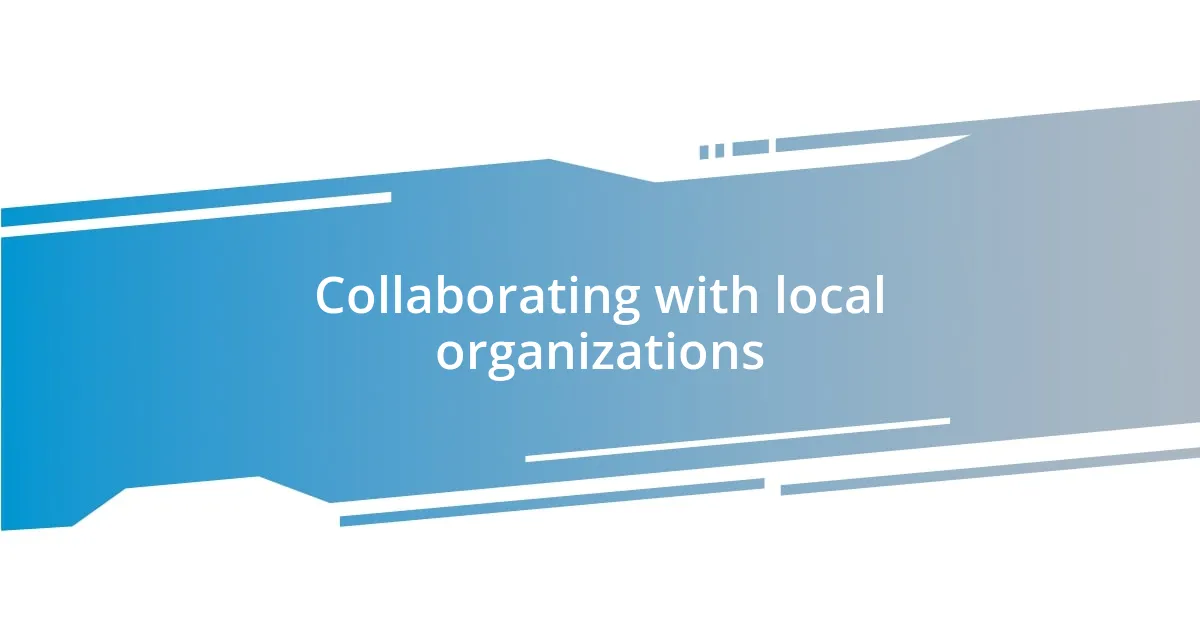
Collaborating with local organizations
Collaborating with local organizations has always been a rewarding journey for me. I recall a particular moment when I teamed up with a local nonprofit focused on sustainability. The plan was simple: host a clean-up event followed by a bee-friendly planting session. Watching community members of all ages come together to dig their hands in the soil and plant flowers that benefit bees was truly heartwarming. It’s incredible how these collaborations can spark a sense of unity while promoting crucial environmental goals.
One of the best aspects of working with local organizations is the wealth of knowledge we can share. I remember a meeting with a local gardening club where we discussed the significance of native plants for bee habitats. Listening to seasoned gardeners share their experiences about how specific plants attract different species of bees was eye-opening. This exchange of ideas not only educated me but also created a bond between us, fostering a cooperative spirit that transcends individual efforts.
Moreover, joining forces with community events often leads to unexpected friendships and partnerships. Just last summer, we organized a local pollinator festival together. As I mingled with fellow vendors and attendees, I couldn’t help but feel a sense of belonging, advocating for something greater than ourselves. Doesn’t it feel special when your passion intersects with the dedication of others? Collaborating amplifies our efforts and echoes through the community, securing a brighter future for our buzzing allies.
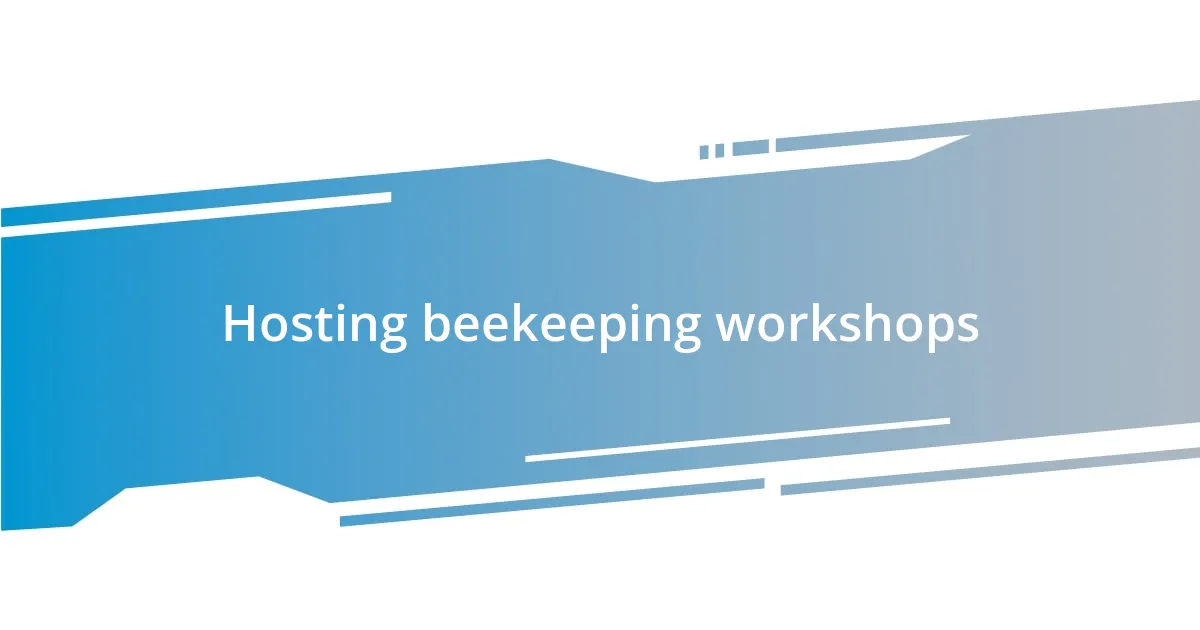
Hosting beekeeping workshops
When I decided to host beekeeping workshops, I was excited about the possibility of sharing my passion. One afternoon, as I set up the materials, I noticed a mother and her daughter eagerly watching—we later found out that this was their first encounter with bees. That day, watching their fascination grow as they donned protective gear and approached the hive felt magical. It reminded me just how powerful these hands-on experiences can be in transforming fear into appreciation.
During another workshop, I introduced participants to the basics of hive management. I recall facilitating a discussion where someone expressed their nervousness about handling bees. After gently guiding them through the process, I could see their anxiety melt away as they carefully examined the frames. This transformation not only builds confidence but also fosters a deeper understanding of the vital role bees play in our ecosystem. Have you ever seen someone’s face light up with joy when they accomplish something they thought was impossible? It’s unforgettable.
What I love most about these workshops is the conversations that emerge afterward. At one event, a retired teacher shared stories from her childhood when she used to keep bees with her family. The connections I’ve witnessed between participants—each bringing their own stories and experiences—create a beautiful tapestry of community learning. Isn’t it incredible how beekeeping can bridge generations and inspire a shared commitment to protecting our pollinators? Hosting these workshops became not just about education, but a catalyst for building relationships that strengthen our resolve to support local beekeeping initiatives.
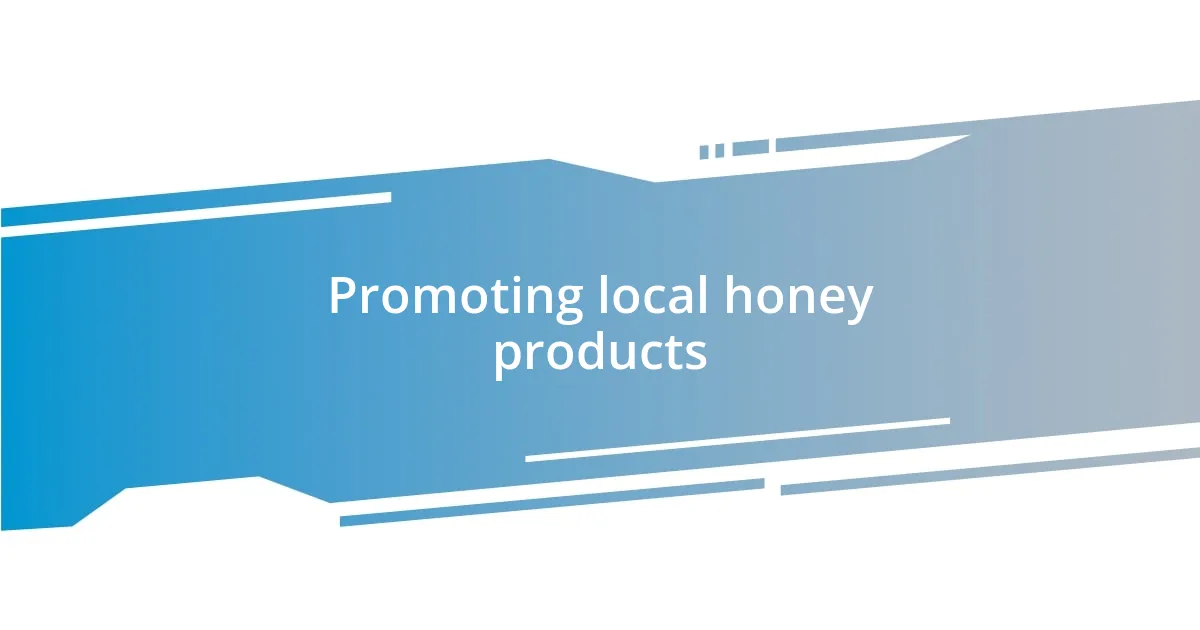
Promoting local honey products
Promoting local honey products is a passion I wholeheartedly embrace. I remember strolling through a vibrant farmer’s market one Saturday, where a charming local beekeeper was selling jars of golden honey. The moment I tasted it, the rich, floral notes burst on my palate—it was nothing like the commercial honey I’d had before. Can’t you just feel the difference when you savor something genuinely local? That experience inspired me to not only purchase honey but also share it with friends, spreading the word about our local producers.
I often host honey-tasting sessions at home, inviting friends to explore the variety of flavors found in local honey. I vividly recall one evening when a friend, initially skeptical of honey’s differences, was blown away by how each jar told a story of its own. From the wildflower honey that tasted like summer in a jar to the robust and complex notes of buckwheat honey, watching their expressions light up was priceless. How exciting is it to discover something new together, transforming a simple gathering into a delightful adventure for the taste buds?
Additionally, I take every opportunity to highlight local honey producers on my social media. I remember featuring a lovely post about a small apiary just a few miles from my home. Their commitment to sustainable practices resonated deeply with my values, and sharing their story felt like amplifying a voice that deserved to be heard. Engaging with the community online not only draws attention to fantastic local products but also nurtures a sense of connection among consumers passionate about supporting local artisans. When we promote local honey, aren’t we also nurturing a culture of appreciation for our hard-working bees?
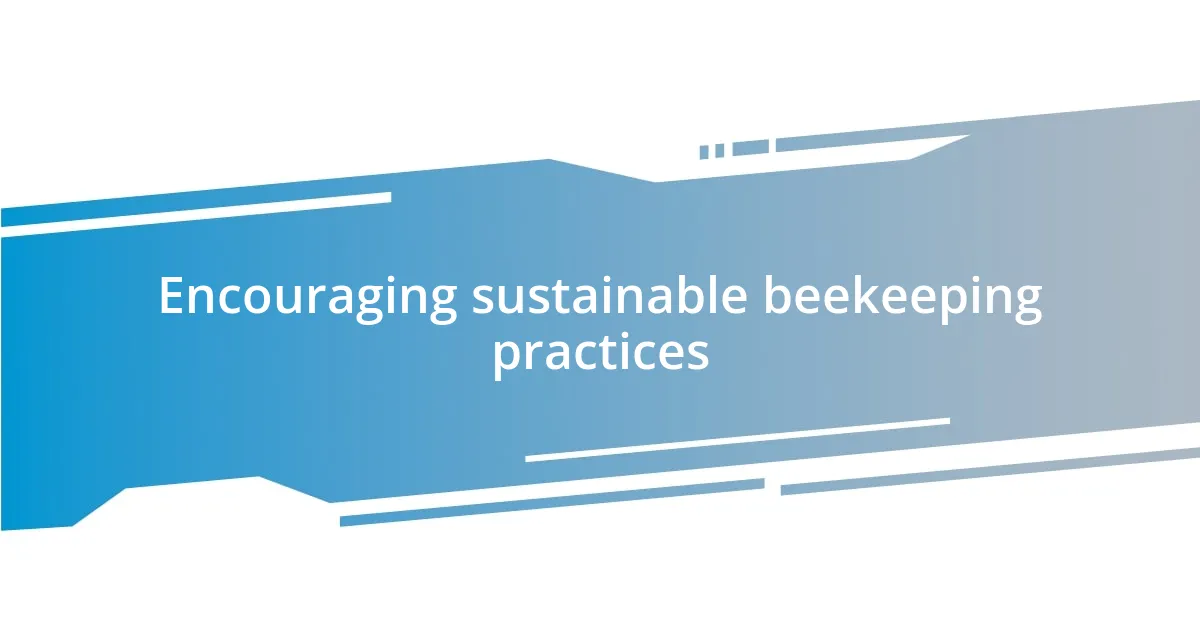
Encouraging sustainable beekeeping practices
I’ve found that encouraging sustainable beekeeping practices often starts with sharing experiences that resonate personally. One afternoon, while tending to my own garden, I noticed the bees were particularly active on my flowers. I couldn’t help but marvel at the harmony in nature when each bee diligently collected nectar and aided in pollination. Seeing them thrive made me realize how key we all are in creating environments that support bees. Have you ever watched a bee dance from flower to flower? It’s a reminder of the vital work these little creatures do and how we can help foster those environments.
Through community talks, I love to emphasize the importance of choosing organic gardening methods. I often recall a memorable moment during a neighborhood gathering when I shared my own transition to organic gardening. As I recounted the trials of losing a few plants to pests initially, I saw nods of understanding from the audience. I explained how, after learning to work with nature—using beneficial insects and native plants—the results were rewarding. Isn’t it fascinating how by changing our approach to gardening, we can directly support sustainable beekeeping? Together, we can cultivate gardens that not only look beautiful but also provide a haven for our pollinator friends.
Engaging in conversations about bee-friendly practices encourages a ripple effect within the community. One time, a friend approached me after hearing about the benefits of diverse planting strategies. She decided to start a pollinator garden at her home, and I offered to help her pick the right flowers. Watching her excitement grow as we selected plants that attracted bees was heartwarming. I can’t help but wonder—how many backyard gardens could become pollinator sanctuaries if we all took that first step? It’s these small commitments that can collectively lead to powerful changes in supporting sustainable beekeeping practices and ensuring the health of bees for years to come.

